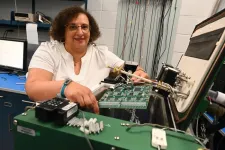(Press-News.org) PROVIDENCE, R.I. [Brown University] — A new study that explores ancient temperatures and rainfall patterns in the tropical Andes of South America has revealed how 16,000 years of climate history in this part of the world was driven by carbon dioxide levels and ocean currents from global climate events.
Led by Brown University researchers, the study marks the first high-resolution temperature record covering the past 16,000 years in the tropical Andes and could help scientists predict and mitigate future climate impacts in tropical regions of the planet. The work is described in the Proceedings of the National Academy of Science.
“Usually when we study climate change in the past, we emphasize the Northern Hemisphere or Southern Hemisphere because of the outsized role they play in affecting climates all over the globe,” said Boyang Zhao, a scientist in Brown’s Department of Earth, Environmental and Planetary Sciences and the study’s first author. “One of the biggest questions we are getting at is what are the driving factors behind temperature history in this part of the tropics, so that we can begin to potentially apply that data and knowledge to other tropical regions.”
Along with future implications, the new study provides a unique look at the way distinct and distant parts of the world influence temperature and weather elsewhere, emphasizing how regional climates are connected to global climate changes.
“Our evidence here suggests that temperatures in this region of the world are more influenced by the Southern Hemisphere — so places like Antarctica,” Zhao said.
The study focused on an analysis of sediment samples from Laguna Llaviucu, a lake located in Ecuador’s Cajas National Park. The measurements from the sediment samples showed that temperature variations in the tropical Andes closely aligned with climate events that saw the planet’s temperatures rise and fall during the past 16,000 years.
Overall, the evidence showed that the main driver in these temperature fluctuations was the concentration of CO2. Researchers saw evidence that the tropical Andean temperatures track with Antarctic temperatures, which are mainly controlled by carbon dioxide concentrations. The findings showed that about 17,000 to 14,000 years ago, tropical Andean temperatures rose when carbon dioxide increased and that the temperatures remained relatively stable about 12,000 years ago when carbon dioxide levels remained relatively stable.
Zhao said that the findings support previous research identifying carbon dioxide as a key driver of global temperature changes since the last Ice Age.
The study also highlighted the role of ocean currents that move warm water from the tropics to the North Atlantic. During a cooling period known as the Antarctic Cold Reversal 14,500 years ago, the northward current was strengthened, causing it to transport more heat northward and cool sea surface temperatures in the south. The researchers found that this cooling effect extended to the tropical Andes.
To reconstruct past climate conditions, the researchers analyzed lipid biomarkers and hydrogen isotopes collected in 2009 from Laguna Llaviucu by scientist Mark Bush from the Florida Institute of Technology. Lipid biomarkers are chemical compounds that provide clues about past temperatures and rainfall patterns. The high-resolution data, combined with accurate dating techniques, allowed the team to create a detailed timeline of climate changes over the past 16,000 years.
According to the researchers, this is the first time organic biomarkers have been used to put together a quantitative climate history for tropical South America. It is traditionally difficult to reconstruct temperatures from the tropics.
The study also points out a number of regional differences in temperature patterns, like how the tropical Andes and Southeast Asia cooled during certain historical periods while other regions like Africa did not. The research also shows how local factors may help to counteract the global effects of rising CO2 levels by looking at differences between past temperature models and what the sediment data show.
The researchers from Brown plan to continue to explore past temperature patterns in this part of the world that historically lacks complete climate records.
“Mountain environments are some of the most sensitive regions on Earth to climate change,” said James Russell, a professor of Earth, environmental, and planetary sciences at Brown who oversaw the new research. “In fact, in the near future, high tropical mountains, such as the Andes, are predicted to experience a rate of warming second only to the Arctic, which is the fastest warming part of the planet.”
Along with Zhao and Russell, authors from Brown also included undergraduate student Aaron Freeman. This work was supported by the U.S. National Science Foundation.
END
New study unveils 16,000 years of climate history in the tropical Andes
Brown University researchers highlight the roles of carbon dioxide and ocean currents as key drivers of temperature fluctuations in the tropical Andes over a 16,000 year period.
2024-08-12
ELSE PRESS RELEASES FROM THIS DATE:
The Society of Huntsman Translational Scholars welcomes two more members
2024-08-12
Huntsman Cancer Institute and the University of Utah (the U) are proud to announce the induction of two physician-scientists, Heloisa Soares, MD, PhD, and Skyler Johnson, MD, as members of The Society of Huntsman Translational Scholars.
The Society of Huntsman Translational Scholars supports scientists who focus on translating research discoveries made in the lab into innovations that improve outcomes for cancer patients. Scholars receive financial support for their scientific work, have opportunities for mentorship, and collaborate with other society members in advancing scientific discoveries.
“The Society of Huntsman Translational Scholars ...
UMass Amherst researchers create new method for orchestrating successful collaboration among robots
2024-08-12
AMHERST, Mass. – New research from the University of Massachusetts Amherst shows that programming robots to create their own teams and voluntarily wait for their teammates results in faster task completion, with the potential to improve manufacturing, agriculture and warehouse automation. This research was recognized as a finalist for Best Paper Award on Multi-Robot Systems at the IEEE International Conference on Robotics and Automation 2024.
“There’s a long history of debate on whether we want to build a single, powerful humanoid robot that can do all ...
Co-mentors announced in unique opportunity for PCCM fellows
2024-08-12
Glenview, Illinois – For the second year of the APCCMPD and CHEST Medical Educator Scholar Diversity Fellowship, Tristan Huie, MD, FCCP, and Anna Neumeier, MD, will be co-mentors for 2025.
Designed to pair a fellow-in-training with an established medical educator, the unique scholarship was launched in August 2023 by the American College of Chest Physicians (CHEST) and the Association of Pulmonary and Critical Care Medicine Program Directors (APCCMPD) to improve diversity in respiratory care.
The program focuses on creating opportunities for fellows at institutions ...
AI poses no existential threat to humanity – new study finds
2024-08-12
ChatGPT and other large language models (LLMs) cannot learn independently or acquire new skills, meaning they pose no existential threat to humanity, according to new research from the University of Bath and the Technical University of Darmstadt in Germany.
The study, published today as part of the proceedings of the 62nd Annual Meeting of the Association for Computational Linguistics (ACL 2024) – the premier international conference in natural language processing – reveals that LLMs have a superficial ability to follow instructions and excel at proficiency in language, ...
Routine lab tests are not a reliable way to diagnose long COVID
2024-08-12
A National Institutes of Health (NIH)-supported study has found that routine lab tests may not be useful in making a long COVID diagnosis for people who have symptoms of the condition. The study, part of NIH’s Researching COVID to Enhance Recovery (NIH RECOVER) Initiative and published in the Annals of Internal Medicine, highlights how challenging it can be to identify and diagnose a novel illness such as long COVID.
“Our challenge is to discover biomarkers that can help us quickly and accurately diagnose long ...
Tracking the color of light
2024-08-12
Since the first demonstration of the laser in the 1960s, laser spectroscopy has become an essential tool for studying the detailed structures and dynamics of atoms and molecules. Advances in laser technology have further enhanced its capabilities. There are two main types of laser spectroscopy: frequency comb-based laser spectroscopy and tunable continuous-wave (CW) laser spectroscopy.
Comb-based laser spectroscopy enables extremely precise frequency measurements, with an accuracy of up to 18 digits. This remarkable precision led to ...
Common mechanisms underpinning neurodevelopmental disorders and psychiatric diseases
2024-08-12
Recent large-scale epidemiologic studies have increasingly suggested that aberrant brain development and psychiatric disorders may share common mechanisms. The interplay between genetic variants and environmental stress has been shown to significantly impact genome integrity, reshaping brain development. This can result in changes to neural networks, which are linked to neurodevelopmental and psychiatric disorders—areas where many questions remain unresolved.
For more information, visit: bit.ly/4ddJSV0
For contributing article to this research topic, visit: bit.ly/4crNG41
Please use the Hot-Topic Code: BMS-CMP-2024-HT-33 ...
Department of Energy announces 2024 Office of Science Distinguished Scientist Fellows and lecture series
2024-08-12
WASHINGTON, D.C. – Four of the nation’s top scientists have each been awarded $1 million in direct funding via the Department of Energy (DOE) Office of Science Distinguished Scientist Fellows program.
The program was established to develop, sustain, and promote scientific and academic excellence in Office of Science (SC) research through collaborations between universities and national laboratories.
The awards, authorized by the America COMPETES act, are bestowed on senior national laboratory scientists. The United States has ...
Mary Bishai named Distinguished Scientist Fellow
2024-08-12
UPTON, N.Y. — Physicist Mary Bishai of the U.S. Department of Energy’s (DOE) Brookhaven National Laboratory has been named a 2024 DOE Office of Science Distinguished Scientist Fellow. The honor recognizes her “enduring contributions at the intensity frontier of high energy physics in unraveling fundamental properties of neutrinos, extraordinary leadership and service to the particle physics community, and deep commitment to broadening participation through mentoring next generation scientists.”
As described in a DOE Office of Science press release issued today, the ...
Can meditation and stretching relieve cramping caused by cirrhosis?
2024-08-12
People suffering from cirrhosis may find some symptom relief from two accessible activities: stretching and meditation.
A study from the University of Michigan compared the two therapies as a means to relieve nocturnal muscle cramps and found both effective.
The resulting paper, “The RELAX randomized controlled trial: Stretching versus meditation for nocturnal muscle cramps,” appeared in Liver International.
The study
Two out of every three people with cirrhosis experience muscle cramps at night that wake them from sleep.
Since ...
LAST 30 PRESS RELEASES:
Tiny flows, big insights: microfluidics system boosts super-resolution microscopy
Pennington Biomedical researcher publishes editorial in leading American Heart Association journal
New tool reveals the secrets of HIV-infected cells
HMH scientists calculate breathing-brain wave rhythms in deepest sleep
Electron microscopy shows ‘mouse bite’ defects in semiconductors
Ochsner Children's CEO joins Make-A-Wish Board
Research spotlight: Exploring the neural basis of visual imagination
Wildlife imaging shows that AI models aren’t as smart as we think
Prolonged drought linked to instability in key nitrogen-cycling microbes in Connecticut salt marsh
Self-cleaning fuel cells? Researchers reveal steam-powered fix for ‘sulfur poisoning’
Bacteria found in mouth and gut may help protect against severe peanut allergic reactions
Ultra-processed foods in preschool years associated with behavioural difficulties in childhood
A fanged frog long thought to be one species is revealing itself to be several
Weill Cornell Medicine selected for Prostate Cancer Foundation Challenge Award
Largest high-precision 3D facial database built in China, enabling more lifelike digital humans
SwRI upgrades facilities to expand subsurface safety valve testing to new application
Iron deficiency blocks the growth of young pancreatic cells
Selective forest thinning in the eastern Cascades supports both snowpack and wildfire resilience
A sea of light: HETDEX astronomers reveal hidden structures in the young universe
Some young gamers may be at higher risk of mental health problems, but family and school support can help
Reduce rust by dumping your wok twice, and other kitchen tips
High-fat diet accelerates breast cancer tumor growth and invasion
Leveraging AI models, neuroscientists parse canary songs to better understand human speech
Ultraprocessed food consumption and behavioral outcomes in Canadian children
The ISSCR honors Dr. Kyle M. Loh with the 2026 Early Career Impact Award for Transformative Advances in Stem Cell Biology
The ISSCR honors Alexander Meissner with the 2026 ISSCR Momentum Award for exceptional work in developmental and stem cell epigenetics
The ISSCR honors stem cell COREdinates and CorEUstem with the 2026 ISSCR Public Service Award
Minimally invasive procedure effectively treats small kidney cancers
SwRI earns CMMC Level 2 cybersecurity certification
Doctors and nurses believe their own substance use affects patients
[Press-News.org] New study unveils 16,000 years of climate history in the tropical AndesBrown University researchers highlight the roles of carbon dioxide and ocean currents as key drivers of temperature fluctuations in the tropical Andes over a 16,000 year period.


